CarbonHQ: Building Solutions to Scale up Clean Cooking Carbon Projects
CarbonHQ offers software and project finance advisory to carbon project developers focusing on clean cooking. The Clean Cooking Alliance (CCA) spoke with CarbonHQ CEO and Co-Founder Allen Fan about the company’s journey, from early inspiration to growth stage.
This interview is part of a series of conversations CCA is having with leaders across the clean cooking sector.
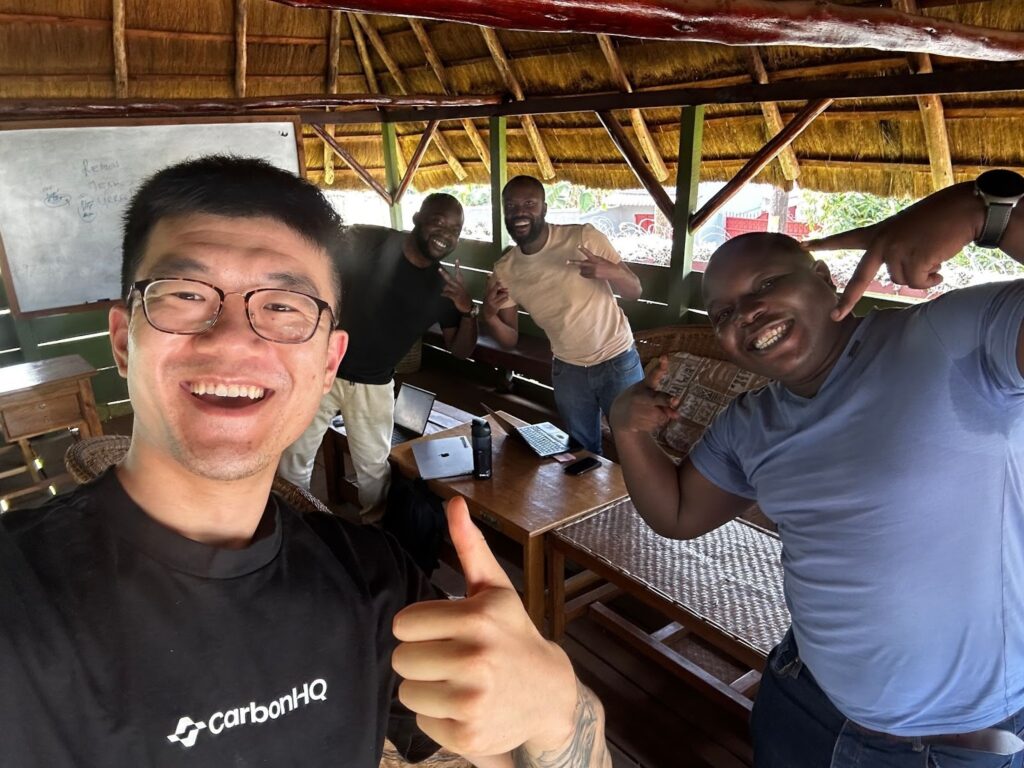 Collaborating with the UpEnergy team in Kampala, Uganda
Collaborating with the UpEnergy team in Kampala, Uganda
Clean Cooking Alliance (CCA): Can you tell us about your company’s products and services?
Allen Fan: At a high level, CarbonHQ has two different offerings for carbon project developers: a software platform and project financing services.
On the software side, our platform helps project developers collect, manage, and process carbon project data. It turns that data into quantified carbon credits and handles everything from credit calculation to contract management and inventory tracking. We’re also building digital MRV (monitoring, reporting, and verification) functionalities that allow project developers to directly transfer information to standard bodies. So, it really covers the full process of carbon project development, from data collection to issuing and selling credits.
On the services side, drawing from my background in accounting, finance, and carbon investment, we help developers prepare investor-grade financial models and decks, and connect them with project financiers and credit off-takers. Many early-stage developers are still trying to get their projects up and running, so we support them with that process and then, hopefully, they also transition to using our software.
CCA: What percentage of your clients focus on clean cooking carbon projects?
Allen Fan: Currently, 100% of our clients are involved in clean cooking in some form. That’s by design: my professional background is rooted in clean cooking, and I’m passionate about supporting this impactful sector. We specifically chose to focus on household and community-based carbon projects, which include cooking technologies.
Our clients include UpEnergy—one of the largest clean cooking and water filtration developers globally— as well as Spouts International, which is expanding from clean water into clean cooking, and DGB, which operates clean cooking and ARR (afforestation, reforestation and revegetation) projects across Africa.
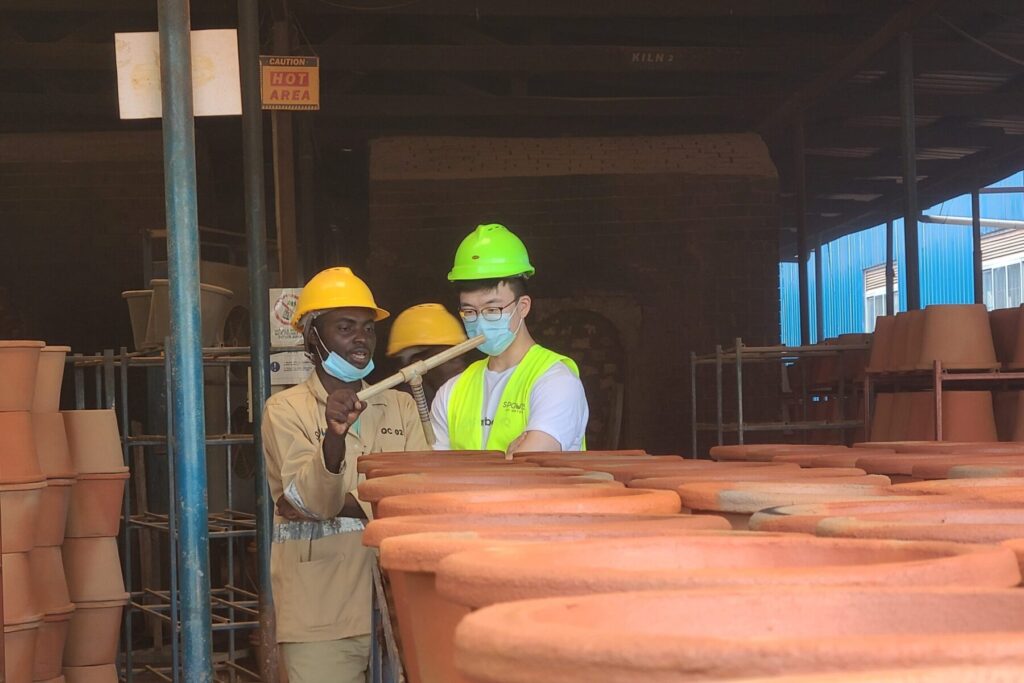 Visiting Spouts International in Kampala, Uganda
Visiting Spouts International in Kampala, Uganda
CCA: Was there a particular moment that inspired the creation of CarbonHQ?
Allen Fan: Yes. Before founding CarbonHQ, I worked at CQuest Capital (now Bridge Carbon) as an investment manager. During my time there, we rapidly scaled up operations. However, managing the complexity of growing projects across time zones with only Excel, PDFs, and emails became extremely stressful and inefficient.
I’m based in Australia; I was regularly waking up at 5 a.m. to speak with the U.S. team and staying up late for project update calls. So I started day dreaming about a system that could solve these challenges, and quickly realized that the right system would be so complex that it wouldn’t make sense for any project developer to build and operate internally. I also assumed that if we were struggling with this, others must be, too—or they would be once they scaled up. And the world definitely needs carbon projects to scale up if we’re going to tackle climate change.
That’s when I decided to start CarbonHQ, and I was very fortunate to meet my co-founder, Eugene Datsky. He’s a software wizard who was looking to do something really impactful after working at a number of big, global tech companies such as Canva, Yandex, and Jetbrains.
I’m incredibly proud of our work helping carbon project developers thrive.
[ Stay up to date on the most recent Leadership Series article. Sign up to receive our newsletter. ]
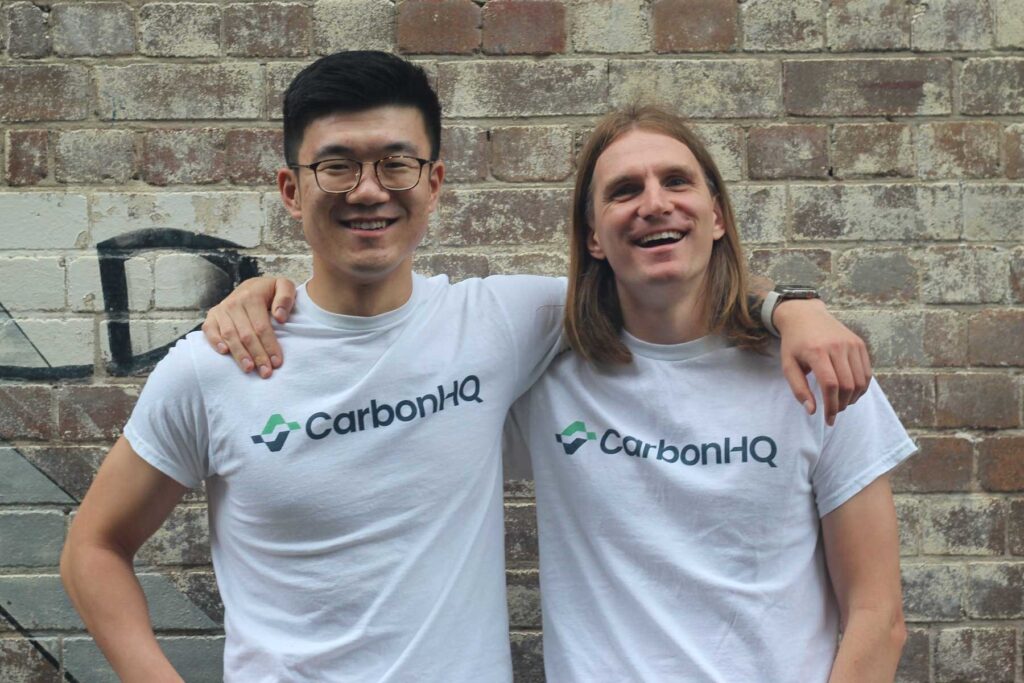 CarbonHQ co-founders Allen Fan and Eugene Datsky
CarbonHQ co-founders Allen Fan and Eugene Datsky
CCA: How has the company and its services evolved since you co-founded it?
The first year was all about discovery. We spoke with nearly every clean cooking project developer we could find to better understand their experiences, current solutions, and ongoing challenges. We then came up with a minimum viable product and signed some agreements with project developers to test our solution.
The second year began with raising a US $400,000 pre-seed round from Australian venture capital funds and winning the CCA–UNCDF Digital Innovation Challenge. That allowed us to hire more team members and to build a commercially viable product.
In our third year, we have focused on putting our developed product into action—running pilot projects all around the world and refining features based on real-world feedback.
We’re now reaching a new and exciting phase of implementing a commercially viable product with more project developers.
In movies, you would simply cut the scene to suddenly having a product, a team, and customers. But in reality, it’s more difficult. We’ve come an incredibly long way.
CCA: What problems have you discovered by speaking with all those project developers?
Allen Fan: The two main challenges that all developers face are: 1) how long it takes to issue credits; and 2) selling credits for a favorable price after they are issued. These problems feed into each other – the longer it takes developers to issue credits, the more credits they need to issue to make the project work, which makes it more difficult to sell.
Reducing issuance times will be game changing for project developers, but this can only be done through structuring project data so manual processes can be automated.
Lots of project developers are starting to realize the need for a system to structure project data but, without any purpose-built solutions, many end up spending lots of money customizing Salesforce or developing their own internal solutions that are not interoperable.
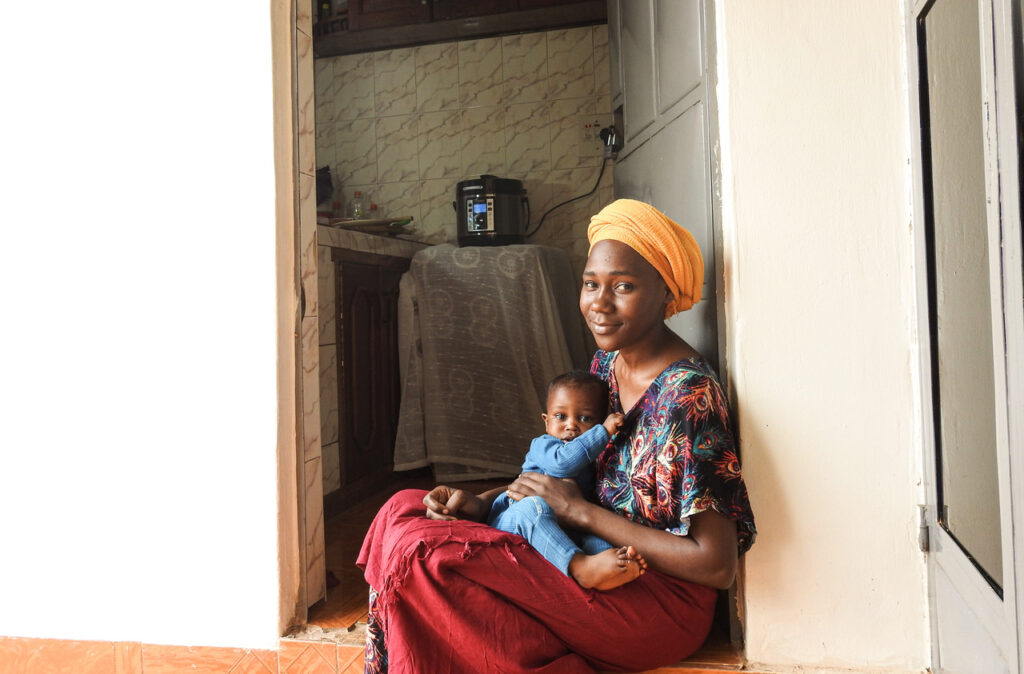 © UpEnergy
© UpEnergy
CCA: You mentioned the 2023 Digital Innovation Challenge. Can you tell us how that experience contributed to your company’s development?
Allen Fan: Just the fact that the Digital Innovation Challenge existed was a huge vote of confidence because it aligned really well with our assessment of what project developers were struggling with. And because we were just starting out, we were desperately looking for a way to get in front of industry organizations and project developers. We put a lot of effort into our application and were thrilled to be selected to participate.
For the challenge itself, it was very meaningful to be able to visit Kenya and meet like-minded people who really understood what we did and were focused on solving industry challenges.
After we were selected as one of the winners, we received a lot of support, including some grant funding as well as budget for two technical assistance projects: one to explore AI capabilities to extract information from PDF documents, and another to work with the carbon project consultancy Hamerkop to map the end-to-end experience of carbon project developers from inception to credit issuance. That process was incredibly helpful and produced a document we still use today.
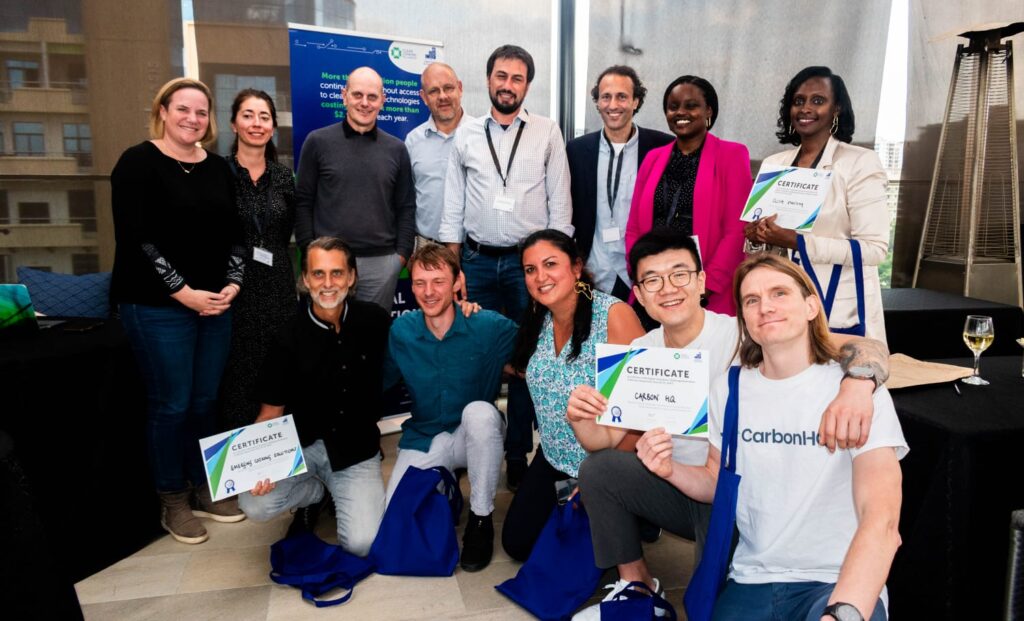 At the conclusion of the Digital Innovation Challenge in Nairobi, Kenya.
At the conclusion of the Digital Innovation Challenge in Nairobi, Kenya.
CCA: Can you share some examples of how clients have used CarbonHQ to improve their operations?
Allen Fan: It’s interesting to see customers using our platform in different ways. For DGB, which is a very large, Netherlands-based project developer that runs carbon projects and already has many buyers, CarbonHQ manages their carbon credit sales operations, contracting, and credit portfolio. They’ve even created internal process documents on how to use CarbonHQ, which is really cool to see.
As for other cookstove-focused carbon project developers, they’re making the most use out of the project data management aspect of the platform. We often see project developers using digital tools to collect data, but unfortunately it then goes into Excel spreadsheets, where data cleaning becomes a manual process—which is neither scalable nor fun. Also, they often rely on a generic CRM (customer relationship management) platform that is not designed for carbon projects and so requires expensive customization. That’s where CarbonHQ can offer a cost-effective solution. UpEnergy switched entirely from Salesforce to our platform and slashed their software spending by 50%. Those are dollars that can go right back into their projects.
CCA: You have launched a new website–congratulations! What does this milestone represent for CarbonHQ?
Allen Fan: It marks the beginning of a new phase. Our original website was built when we had no product—just an idea. Now, we have a tested platform and real-world results to share.
The new website will feature detailed product screenshots and implementation case studies so that project developers can see the impact of our work and what our solution could mean for them. It’s our “we’re open for business” moment.
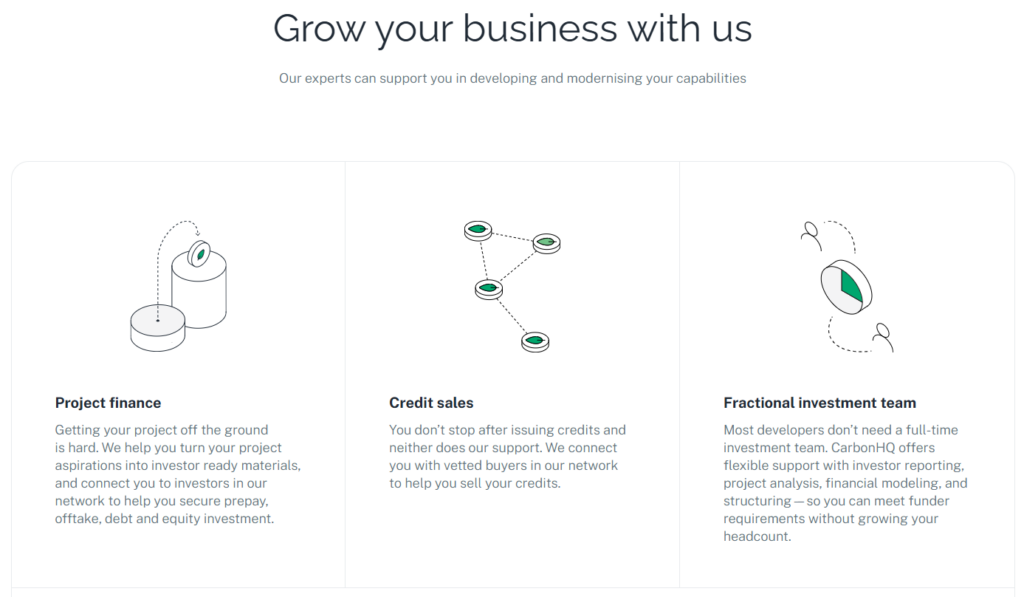 CarbonHQ’s new website
CarbonHQ’s new website
CCA: How do you see your business, and the clean cooking carbon sector more broadly, developing in the coming years?
Allen Fan: After some challenging years, I think many of the sector’s issues have been addressed. The market is turning thanks to developments like the Core Carbon Principles, new methodologies like CLEAR, and credit demand from CORSIA. In the next 1-3 years, I think significant capital will start flowing into clean cooking because the model is proven, scalable, and quickly generates carbon credits—and we hope to make that process even quicker. Our vision is one platform where project developers can internally handle their data while standards bodies can access the information needed to digitize the issuance of credits—reducing what is typically a six-to-twelve-month process down to a few weeks or even days. And then to enable project developers to leverage all this data to tell a better story to their buyers and investors.
CCA: Do you have any advice for other carbon tech companies about getting to scale?
Allen Fan: Stay lean and efficient. Maintain a small team and use existing solutions rather than building your own software. Try to get out in front of the market early to talk about what you do. Don’t worry about glamorous announcements on social media—focus on delivering for your own customers and making a little progress every day.
